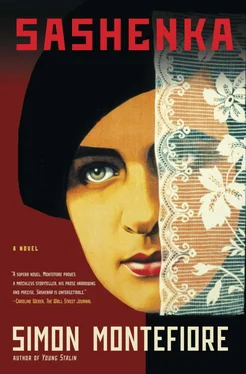A stunted man in pince-nez, an oversized coachman’s sheepskin and a leather peaked cap with earmuffs stood on the Nevsky Prospect, watching the streetcar rumble toward him. It was dark, and a bitter blizzard whipped his face, already red and raw. The colossal General Staff building was on his left.
Mendel Barmakid looked behind him. The shpik —the secret-police spook—was still there, a mustachioed man with a military bearing in a green coat, trying to keep warm. Spooks tended to work in twos but he could not see the other one. Mendel was outside the illuminated windows of Chernyshev’s, one of his sister’s cheaper dressmakers. In a display window of mannequins in that season’s velvet and tulle, he saw himself: a dwarf with a clubfoot, fat lips and a neat beard on the end of his chin. It was not an attractive sight but he had no time for sentimental indulgences. Nevsky was almost empty. The temperatures were falling—tonight it was minus twenty and the spooks had found him again when the Petrograd Committee met at the secret apartment in Vyborg. It was only ten days since his escape from exile, and now those police clods would debate whether to arrest him again or allow him to lead them to more comrades.
The streetcar stopped with a ringing of bells and a little meteor shower of sparks from the electric cables above. A woman got out. The spook beat his gloves together, his Cossack earring catching the light of the streetlamp.
The streetcar creaked forward. Suddenly Mendel ran toward it, his bad limp giving him a peculiar gait. His body twisted like a human parabola but he ran very fast for a cripple. The streetcar was moving now. It was hard to run in the snow and even though Mendel did not look back, he knew that the young, fit spook had already spotted him and was giving chase. Mendel grabbed hold of the bar. The conductor, shouting, “Well run, old man!” seized his other arm and pulled him up.
Sweating inside his sheepskin, Mendel glanced back: the spook was running behind—but he was not going to make it. Mendel saluted him, noble-style, touching his brim.
He traveled two stops, then slipped off the streetcar at the pink Stroganov Palace and again checked his tails. No one—though they always found him again. He passed the colonnades of the Kazan Cathedral, where he sometimes met comrades on the run from exile. The snow was slicing at the orange lanterns and he had to keep rubbing the lenses of his pince-nez. He saw only the shops of the bloodsucking classes—the Passazh with its English tailors and French jewelers; the Yeliseyev Emporium piled obscenely high with hams, sturgeons, cakes, oysters, clams, Indian teas and Fortnum & Mason fruitcakes; the labyrinthine Gostiny Dvor, with its bearded merchants in caftans selling antique icons and samovars.
Mendel heard the clipclop of horsemen—two gendarmes on patrol, but they were chatting to each other loudly about a whore in Kaluga and did not see him. He waited at the window of Yeliseyev’s till they were gone. Then a Rolls-Royce sped by, and coming the other way a Delaunay: perhaps it was Zeitlin?
He reached the Hotel Europa, with its doormen in scarlet greatcoats and top hats. Its foyer and restaurant were the most heavily spied-upon square feet in the whole of Europe—and that was why he felt safe. No one would expect an escaped exile to linger here. But his coat was ragged and darned, while the folk around here were in sables, frock coats, guardsmen’s rig. Already the doorman, who was a police agent, was staring at him.
Mendel heard the dry swish of the sleigh. He limped over to a doorway to watch it come, searching for signs of shpiki and fileri , external agents. But the sleigh looked kosher, just one old hunched coachman.
Mendel hailed it and climbed in.
“Where to, sir?”
“The Taurida Palace.”
“Half a ruble.”
“Twenty kopeks.”
“The price of oats is up again. Can hardly feed the horse on that…”
Oats and more oats, thought Mendel. Prices were rising, the war was disastrous. But the worse, the better: that was his motto. The coachman, decided Mendel, was really a petit bourgeois with no role in the future. But then in Russia there were so few real proletarians on the Marxist model. Nine out of ten Russians were obstinate, backward, greedy, savage peasants. Lenin, with whom Mendel had shared sausages and beer in Cracow before the war, had mused that if the peasants did not accept the progress of history, their backs would have to be broken. “Cruel necessity,” muttered Mendel.
Mendel was grey with exhaustion and malnutrition. It was hard to sleep, hard to eat on the run—yet somehow this existence suited him almost perfectly. No family—but then children bored him. Marriage—yes, but to Natasha the Yakut, another dedicated comrade whom he met only sporadically. Always on the move, he could sleep as easily on a park bench as on a floor or a sofa. Lenin was in Switzerland and virtually the entire Central Committee—Sverdlov, Stalin, Kamenev—were in Siberia, and he was almost the last senior veteran of 1905 on the loose. But Lenin had ordered: “You’re needed in Piter: escape!” He had sent Mendel a hundred rubles to buy “boots”—his false identity papers.
All that mattered was the Party and the cause: I am a knight of the holy grail, Mendel thought, as the sleigh approached the domed portico and splendid Doric colonnade of the Taurida Palace, where the bourgeois saps of the talking-shop parliament—the Imperial Duma—now held their absurd debates. But before the sleigh was there, Mendel leaned forward and tapped the padded shoulder of the coachman.
“Here!” Mendel pressed some kopeks into the coachman’s mitten and jumped off. Cars stood with their engines turning outside the Duma but Mendel did not approach the palace. Instead he limped into the lodge attached to the guardhouse of the Horse Guards regiment next door. An old Adler limousine with the crest of a Grand Duke, bearing a Guards officer and a flunkey in court uniform, stopped and trumpeted its horn.
The gateman, simultaneously bowing, buttoning up his trousers and holding onto his hat, ran out and tried to open the gates. Mendel glanced around and knocked on the dusty door of the cottage.
The door opened. A ruddy-cheeked doorman in a Russian peasant smock and yellowed longjohns let him into a dreary little room with a stove, samovar and the fusty atmosphere of sleeping men and boiling vegetables.
“You?” said Igor Verezin. “Thought you were in Kamchatka.”
“Yeniseisk Region. I walked.” Mendel noticed the doorman had a pointed bald pate the shape and color of a red-hot bullet. “I’m starving, Verezin.”
“ Shchi soup, black Borodinsky bread and a sausage. The samovar’s boiling, comrade.”
“Any messages for me?”
“Yes, someone pushed the newspaper through the door earlier.”
“Someone’s coming tonight.”
Verezin shrugged.
“Where’s the paper? Let me see. Good.” Mendel threw off his coat, checked the back window and the front. “Can I sleep?”
“Be my guest, comrade. The sofa’s yours though I might bed down myself there in a minute.” There was no bed in the dim little room and the doormen took turns sleeping on the sofa. “So how did you escape?”
But Mendel, still wearing his hat, boots and pince-nez, was already stretched out on the sofa.
There was a rap on the door, and the doorman found a teenage girl in a gleaming fur coat, undoubtedly sable, and a white fox-fur stole, who stepped hesitantly into the room. She was slim with a wide mouth and exceedingly light grey eyes.
“I’m in luck today!” joked Verezin. “Excuse my pants!”
She gave him a withering look. “ Baramian? ” she asked.
Читать дальше












